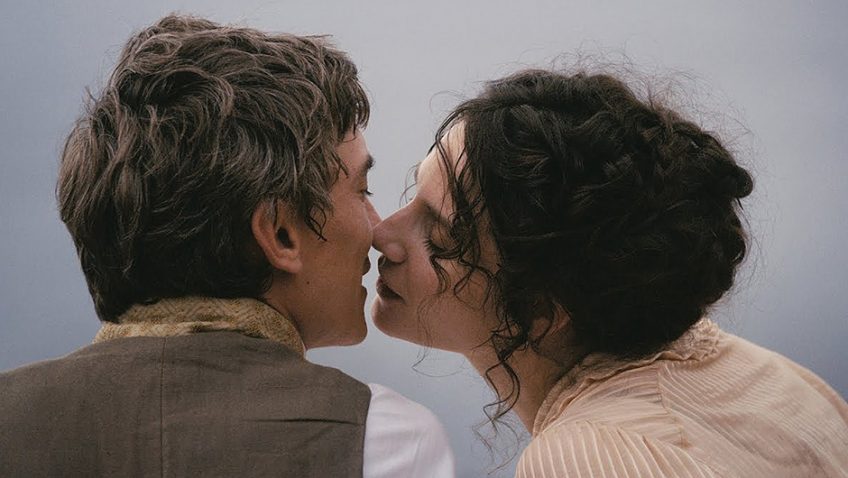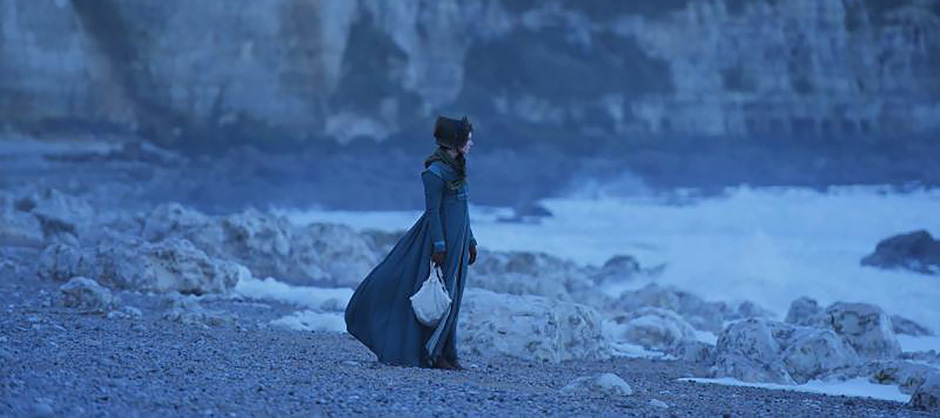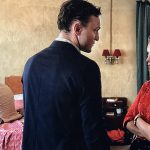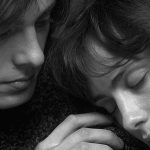Joyce Glasser reviews A Woman’s Life (January 12, 2018) Cert 12A), 115 min.
Like Stephane Brizé’s, Mademoiselle Chambon and 2015’s The Measure of a Man, A Woman’s Life is a well-acted and beautifully observed French film that turns ordinary lives into riveting drama. This time, however, he leaves the 21st century working-classes for the 19th century aristocracy for, as we know, no class and no age is immune to unhappiness. Brizé (again working with co-writer Florence Vignon) also astutely adapted Guy de Maupassant’s 1883 novel, A Life
, without any of the clumsy tropes of so many screen adaptations, such as expository dialogue, narration from the book and flashbacks. The fine cast and Antoine Hérberlé’s mesmerising cinematography tell the tale – unusual for a literary adaptation – with relatively few words.
Jeanne (Judith Chemla) is welcomed home to the chateau on the Normandy coast that she will be inheriting by her delightful and generous parents, Baron Simon-Jacques Le Perthuis des Vauds (Jean-Pierre Darroussin) and her mother La Baronne Adélaïde (played by the excellent Yolande Moreau, Séraphine, Vagabond). Jeanne and her father spend quality time together planting shoots behind the estate – and yet something is not quite right. Jeanne, whose dress trails in the muddy water she pours on the seeds, has to be shown how to plant. She is an unlikely farmer’s daughter, even if the Baron owns a portfolio of farms as a landlord.
Antoine Héberlé’s camera lingers on the fringe of Jeanne’s dress as it clumsily uproots a freshly planted shoot. This is precisely the kind of detail Brizé relies on to convey character, to foreshadow events and to turn Maupassant’s rural drama into a cinematic experience. Brizé’s tight framing conveys the limits of Jeanne’s world and her knowledge of it.
One reason why Jeanne is so unprepared for the life she will be inheriting is explained in the following scene inside the house, where the family are happily playing chess and catching up. We see Jeanne’s drawings of the convent where she has been brought up, shielded from the outside world. The breaks were too short to allow her to return home, but now she revels in the warmth of the sunlight on walks with her mother, as their thoughts turn to marriage.
Jeanne is an obedient young woman with money, attractive rather than beautiful and frightfully naïve. When, almost on command, the family are paid a visit by the handsome, eligible Viscount Julien de Lamare (Swann Arlaud) Jeanne is thrilled. Her school girl romantic view of married life seems to be confirmed in the short courtship, but no sooner are they married then the disillusionment starts.
The wedding night is shown in a sequence so sparsely lit and close-cropped that we can barely see what is going on. It is as though Brizé wants us to feel as bewildered as Jeanne when Julien suddenly springs on top of her as though to stifle her. He tells her not to be afraid, but does nothing to assuage her fear. As Jeanne pleads with him to stop, Julien continues to satisfy himself.
Of Jeanne’s depression, Maupassant writes, “…there was nothing left to do, today, tomorrow, ever again. And she sensed all this in some way as a kind of disillusion, as the collapse of her dreams.” Brazé’s direction and Chemla’s incredible performance translate that sentiment to the screen. Boredom, loneliness, and a sense of entrapment are all conveyed through Jeanne’s demeanour and face.
Unlike some of the dashing husbands who marry for money in 19th century novels (Far from the Madding Crowd springs to mind), Julien is no spendthrift. Jeanne is freezing during their first winter together as Julien objects to her lighting fires the way that her parents used to. ‘This is our house now’, he reminds her as though she could forget: ‘Stop saying mama and papa..!’
The temperature in the house is symbolic of Julien’s cold nature which is compounded by his duplicity. Just as Jeanne discovers that she is pregnant, she learns that the family housekeeper Rosalie (Nina Meurisse), who is like a sister to Jeanne, is pregnant, too. Rosalie refuses to tell the family who the father is, but the local priest (Olivier Perrier) intervenes for the first, but not the last time. He encourages Julien to admit his sin and beg forgiveness and for Jeanne to accept it. With a child on the way, Jeanne reluctantly accepts her husband’s false promises.
The changing seasons and Jeanne’s gaunt complexion signal the passage of time. One by one those closest to Jeanne die off, leaving her world revolving around her only son, Paul (Finnegan Oldfield). Paul, who was sent off to a boarding school where he was bullied, seems to have inherited the worst traits of his mother and of his father. He grows into a spoilt, duplicitous cad who gambles away two of his grandfather’s farms before disappearing to London. After his grandfather’s death, he continues to beg his mother for money from abroad for seven years. Perhaps feeling guilty about Paul’s unhappy childhood, Jeanne gives him the money as a proxy for the love his late father withheld, and that he is incapable of feeling.
As you follow Jeanne through the stages of her life, you might find yourself apportioning blame for the tragic turn in events, although the ending allows a ray of light to re-enter Jeanne’s darkening life. Society’s hypocritical and conservative attitudes and the disastrous religious dogma of the Church come under attack.
But if there are some obvious villains, everyone (including Jeanne) shares some of the blame. Jeanne’s parents have kept her sheltered and ignorant about sex and the management of the farm, and Jeanne is herself to blame for allowing her neediness to blind her to Paul’s blackmail. This weakness tests the rekindled friendship between Jeanne and Rosalie who returns, a widow, to care for Jeanne.
Emotionally convincing and draining, Jeanne’s journey through a life of disillusionment is on a par with Thomas Hardy at his bleakest.
You can watch the film trailer here:






